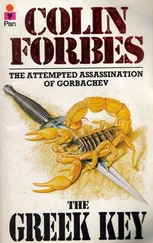Colleen McCullough - 2. The Grass Crown
Здесь есть возможность читать онлайн «Colleen McCullough - 2. The Grass Crown» весь текст электронной книги совершенно бесплатно (целиком полную версию без сокращений). В некоторых случаях можно слушать аудио, скачать через торрент в формате fb2 и присутствует краткое содержание. Жанр: Современная проза. Описание произведения, (предисловие) а так же отзывы посетителей доступны на портале библиотеки ЛибКат.
- Название:2. The Grass Crown
- Автор:
- Жанр:
- Год:неизвестен
- ISBN:нет данных
- Рейтинг книги:5 / 5. Голосов: 1
-
Избранное:Добавить в избранное
- Отзывы:
-
Ваша оценка:
- 100
- 1
- 2
- 3
- 4
- 5
2. The Grass Crown: краткое содержание, описание и аннотация
Предлагаем к чтению аннотацию, описание, краткое содержание или предисловие (зависит от того, что написал сам автор книги «2. The Grass Crown»). Если вы не нашли необходимую информацию о книге — напишите в комментариях, мы постараемся отыскать её.
2. The Grass Crown — читать онлайн бесплатно полную книгу (весь текст) целиком
Ниже представлен текст книги, разбитый по страницам. Система сохранения места последней прочитанной страницы, позволяет с удобством читать онлайн бесплатно книгу «2. The Grass Crown», без необходимости каждый раз заново искать на чём Вы остановились. Поставьте закладку, и сможете в любой момент перейти на страницу, на которой закончили чтение.
Интервал:
Закладка:
When Metellus Pius reported the gist of Cinna's advice about Octavius's staying out of sight to Octavius and the rest, every last one of them knew what was in the wind. This was one of the few conferences at which Scaevola Pontifex Maximus was present; it had not escaped notice that he was withdrawing as unobtrusively as possible into the background. Probably, thought Metellus Pius, because he can see victory for Gaius Marius looming, and remembers that his daughter is still affianced to Young Marius. Catulus Caesar sighed. "Well, I suggest that all the younger men quit Rome before Lucius Cinna enters. We will need all our younger boni for the future these awful creatures like Cinna and Marius will not last forever. And one day Lucius Sulla is going to come home." He paused, then added, "I think we old fellows are better off staying in Rome and taking our chances. I for one have no desire to emulate Gaius Marius's odyssey, even were I guaranteed no Liris swamps." The Piglet looked at Mamercus. "What do you say?" Mamercus considered. "I think it imperative you should go, Quintus Caecilius, I really do. But for the moment I shall stay. I'm not such a big fish in Rome's pond." "Very well, I will go," said Metellus Pius with decision. "And I will go," said the senior consul Octavius loudly. Everyone turned to look at him, puzzled. "I will set myself up on a tribunal in the Janiculan garrison," Octavius said, "and wait there for whatever comes. That way, if they are determined to spill my blood, it will not pollute the air or the stones of Rome." No one bothered to argue. The massacre of Octavius's Day made this course inevitable. The following day at dawn Lucius Cornelius Cinna, in his toga praetexta and preceded by his twelve lictors, entered the city of Rome on foot across the bridges linking Tiber Island with either bank of the Tiber River. But, having heard where Gnaeus Octavius Ruso had gone from a friend in the confidence of those inside Rome, Gaius Marcius Censorinus gathered a troop of Numidian cavalry and rode for the fortress on the Janiculum. No one had authorized this sortie indeed, no one knew of it, least of all Cinna. That Censorinus had taken it upon himself to do what he intended to do was Cinna's fault; those of wolfish disposition among Cinna's officers had come to the conclusion that once he entered the city, Cinna would knuckle under to men like Catulus Caesar and Scaevola Pontifex Maximus. That the whole campaign to return Cinna to authority in Rome would end as a dry and bloodless exercise. But Octavius at least would not escape, vowed Censorinus. Finding his entry to the stronghold uncontested (Octavius had dismissed the garrison), Censorinus rode into the outer stockade at the head of his five-hundred-strong troop. And there on the tribunal in the citadel forum sat Gnaeus Octavius Ruso, shaking his head adamantly in response to his chief lictor's pleas that he leave. Hearing the sound of many hooves, Octavius turned and arranged himself properly upon his curule chair, his lictors white-faced in fear. Gaius Marcius Censorinus ignored the attendants. Sword drawn, he came down from his horse, bounded up the tribunal steps, walked to where Octavius sat calmly, and fastened the fingers of his left hand in Octavius's hair. One powerful yank, and the senior consul who did not fight back came to his knees. While the terrified lictors looked on helplessly, Censorinus raised his sword in both hands and brought it down with all the force he could summon upon Octavius's bared neck. Two of the troopers took the dripping head, its face curiously peaceful, and fixed it upon a spear. Censorinus took it himself, then dismissed the squadron back to camp on the Vatican plain; on one point he was not prepared to disobey orders, and that concerned Cinna's edict that no soldiers of any kind were to cross the pomerium. Tossing his sword, helmet, and cuirass to his servant, he mounted his horse clad in his leather under-dress and rode straight to the Forum Romanum, carrying the shaft before him like a lance. Without a word he raised the spear on high and presented the head of Octavius to the unsuspecting Cinna. The consul's initial reaction was naked horror; he recoiled physically, both hands up with palms outward to fend this appalling gift off. Then he thought of Marius waiting across the river, and of all those eyes upon him and his known lieutenant Censorinus. He drew a sobbing breath, closed his eyes in pain, and faced the hideous consequences of his march upon Rome. "Fix it to the rostra," he said to Censorinus. Turning to the silent crowd, he shouted, "This is the only act of violence I condone! I vowed that Gnaeus Octavius Ruso would not live to see me resume my place as consul. He it was together with Lucius Sulla! who began this custom! They put the head of my friend Publius Sulpicius where this head is now. It is fitting that Octavius should continue the custom as will Lucius Sulla when he returns! Look well on Gnaeus Octavius, People of Rome! Look well on the head of the man who brought all this pain and hunger and suffering into being when he slaughtered over six thousand men upon the Campus Martius in the midst of a legally convened assembly. Rome is avenged! There will be no more bloodshed! Nor was the blood of Gnaeus Octavius shed within the pomerium." Not quite the truth; but it would serve.
Within the space of seven days the laws of Lucius Cornelius Sulla came tumbling down. A pale shadow of its old self, the Centuriate Assembly took its example from Sulla by legislating to pass the measures in a bigger hurry than the lex Caecilia Didia prima permitted. Its former powers restored, the Plebeian Assembly then met to elect new tribunes of the plebs, as they were already overdue. A spate of new legislation followed: the Italian and Italian Gallic citizens (but not the freedmen of Rome Cinna had decided not to risk that) were distributed across the thirty-five tribes without let or hindrance or special provisos; Gaius Marius and his fellow fugitives were restored to their rightful positions and ranks; a proconsular imperium was now officially bestowed upon Gaius Marius; the two new tribes of Piso Frugi were abolished; all the men exiled under the original Varian Commission were recalled; and last but not least Gaius Marius was formally given command of the war in the East against King Mithridates of Pontus and his allies. The elections for the plebeian aediles were held in the Plebeian Assembly, after which the Assembly of the Whole People was convoked to elect curule aediles, quaestors, tribunes of the soldiers. Though they were three to four years off their thirtieth birthdays, Gaius Flavius Fimbria, Publius Annius and Gaius Marcius Censorinus were all elected quaestors and appointed immediately to the Senate, neither censor thinking it wise to protest. In an odor of extreme sanctity, Cinna ordered the Centuries to assemble to elect the curule magistrates; he convened his meeting on the Aventine outside the pomerium, as Sertorius was still sitting on the Campus Martius with two legions. A sad gathering of no more than six hundred men of the Classes, most of them senators and very senior knights, dutifully returned as consuls the only two names put up as candidates Lucius Cornelius Cinna, and Gaius Marius in absentia. The form had been observed, the election was legal. Gaius Marius was now consul of Rome for the seventh time, and the fourth time in absentia. The prophecy was fulfilled. Cinna had his little moment of revenge nonetheless; when the consuls were elected, it was he who occupied the senior position, Gaius Marius the junior. Then came the praetorian elections. Only six names were put up to fill six positions, but again the form was observed, the vote could be said to be legal. Rome had her proper array of magistrates, even if there had been a dearth of candidates. Cinna could now concentrate upon trying to rectify the damage of the past few months damage Rome could ill afford to sustain after the long war against the Italians and the loss of the East. Like an animal backed into a corner, the city remained still and vigilant during the remainder of December, while the armies packed around her shifted and redistributed. The Samnite contingents went back to Aesernia and Nola, the latter to lock themselves in again; for Gaius Marius had graciously given Appius Claudius Pulcher permission to remove himself and his old legion back to the siege of Nola. Though Sertorius had the legion, he persuaded its men to go back to work for a commander they despised, and saw it march for Campania without regret. Many of the veterans who had enlisted to help their old general now also returned to their homes, including the two cohorts who had sailed from Cercina with Marius the moment Marius had heard Cinna was moving. Reduced to one legion, Sertorius lay on the Campus Martius like a cat feigning deep sleep. He kept himself aloof from Gaius Marius, who had elected to keep his five-thousand-strong bodyguard of slaves and ex-slaves. What are you up to, you dreadful old man? asked Sertorius of himself. You have deliberately sent every decent element away, and retained that element which is committed to follow you into any atrocity.
Читать дальшеИнтервал:
Закладка:
Похожие книги на «2. The Grass Crown»
Представляем Вашему вниманию похожие книги на «2. The Grass Crown» списком для выбора. Мы отобрали схожую по названию и смыслу литературу в надежде предоставить читателям больше вариантов отыскать новые, интересные, ещё непрочитанные произведения.
Обсуждение, отзывы о книге «2. The Grass Crown» и просто собственные мнения читателей. Оставьте ваши комментарии, напишите, что Вы думаете о произведении, его смысле или главных героях. Укажите что конкретно понравилось, а что нет, и почему Вы так считаете.












